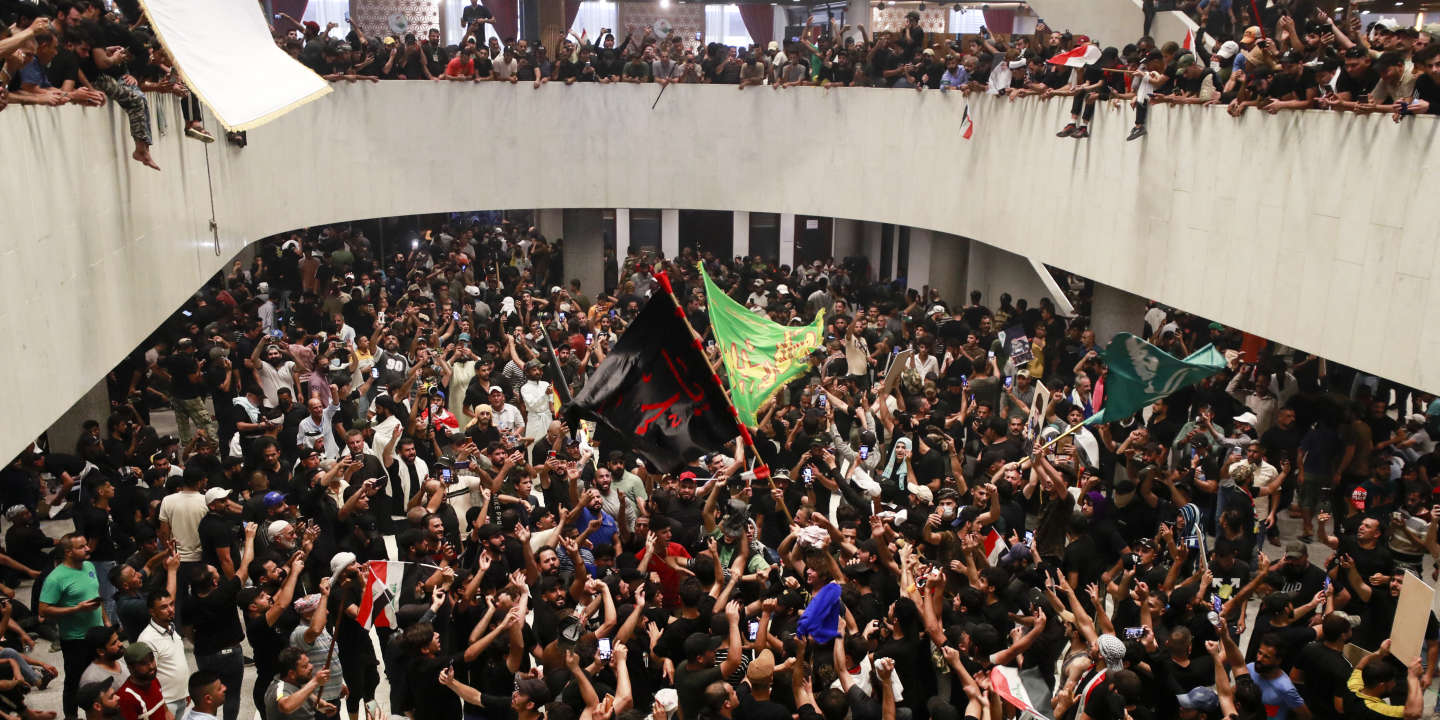Executive Summary
The resignation of 73 Sadrist bloc members of parliament in June has exacerbated Iraq’s political dilemma, paving the way for Iran-affiliated Shiite blocs to dominate the legislative authority. In response, supporters of powerful Iraqi Shia leader Muqtada al-Sadr stormed the Iraqi parliament on July 27, announcing a sit-in until further notice. Iraq’s political deadlock will not be resolved unless there is a genuine endeavour initiated by local actors, backed by the international community, to change the political-cultural environment. There should be a long-term approach that cultivates the concept of citizenship over religious and ethnic identity and curtails the influence of political Islam in shaping political dynamics.
Iran-backed Coordination Framework Replaces Sadrists
Analysts and policymakers speculate that the outcome of the 2021 elections shows the regression of Iran’s influence in the Iraqi political scene, with the success of the Sadrist movement in occupying 73 seats out of 329. Moreover, Sadr orchestrated immense efforts to achieve his ambitious vision by forming the National Salvation Coalition tahalof Inqaz Watan to cross Iraq’s sectarian and national sub-identities. The coalition glued together the Kurdistan Democratic Party (KDP) and the Sunni Sovereignty bloc, led by the speaker of the parliament, Mohamed Halbousi. Even though the coalition included Sunnis and Kurds, consisting of 168 out of 329 members of the parliament, Sadr failed to form a majoritarian government.
Quoting anonymous Lebanese and Iraqi sources, pan-Arab newspaper Asharq al-Awsat claimed that Iran forced Sadr to reach a compromise with the pro-Tehran Coordination Framework over the formation of a new government. The Coordination Framework, which opposes al-Sadr and his movement, is made up of al-Maliki’s party, other Shia leaders who lost influence in the 2021 vote, along with some Sunni lawmakers.
However, in an unexpected move, Sadr withdrew from the Iraqi Council of Representatives (CoR) on June 12, prompting speculation about the future of Iraq. Ihsan Al-Shammari, a professor of politics at Baghdad University and head of the Iraqi Centre for Political Thought, said the withdrawal was triggered by the opposition of Iran-allied Shiite blocs to Sadr’s government formation initiative. One week later, 64 new members took their oaths to fill the legislative vacuum, with the majority affiliated with the Iran-backed Shiite Coordination Framework coalition, which has now become the largest bloc in the parliament and the main actor in the process of forming the new government. The pressing question is, why did Sadr resign?
Sadr Confronts his Rivals in the Streets
In withdrawing Sadrist MPs, the powerful cleric signaled a critical message. He tactically confronts his rivals in the streets, mobilizing his sympathizers and followers, who reportedly protest against the pro-Iran Shia bloc’s nomination for prime minister — Mohammed Shia al-Sudani. Sadr posted on Twitter on July 31, calling for a “peaceful revolution […] to eliminate corruption, monopolized power, loyalty to foreign actors, quotas, and ethnicity.” Commenting on the current protests that broke into the parliament located in the green zone, he added: “This is a great opportunity to radically change the political regime and the constitution.” In the conclusion, he called on Iraqis to support a “Sadrist revolution of reforms.”
There is no doubt that Sadr has a well-established grassroots network and has the power to influence public opinion. Subsequently, he has not relinquished the political path as he continues to strongly support the National Salvation coalition. In an interview with pan-Arab outlet Al-Araby Al-Jadeed, a prominent anonymous member of the Sadr movement emphasised that the goal of the coalition “was not only to form a government, but it is a political alliance whose mission is to maintain Iraq’s sovereignty.” The powerful cleric uses all political means to pressure the current parliament while forming the government.
Conclusion
Indications show his intention to remain present in the political landscape, challenging Iran’s influence. Ironically, Sadrists and Iran-backed actors in Iraq share a common ideological outlook which is rooted in Shia doctrine. Both fight Western influence and seek to root out the United States’ presence in Iraq. Sadr, however, stands firmly against the Iranian influence on Iraq’s internal affairs. He clearly rejects cooperating with the Iran-backed Coordination Framework. The crucial question remains unanswered: what is the appropriate approach to untangle Iraq’s complex political-religious scene? Even though it is impossible to find a straightforward approach, it is necessary to set an abstract map of gradually promoting a secular approach within the context of Baghdad’s political culture. Religion would remain the focal point of Iraqis’ social affairs, but the political emphasis would be on national identity.

